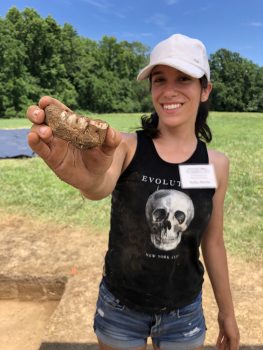Explore America’s Past at Historic St. Mary’s City
2020 Field School in Historical Archaeology
Historic St. Mary’s City (HSMC), in association with St. Mary’s College of Maryland, announces its 2020 Field School in Historical Archaeology. The 2020 field season will be focused on sites in the Mill Field. Located northeast of the Town Center at the heart of the colonial capital, the Mill Field takes its name from its proximity to the 17th-century mill that was critical to the town’s survival. As St. Mary’s City developed in the latter half of the 17th century, the Mill Field become home to a number of the city’s residents. The road to the mill was one of the key elements of the city’s unique Baroque plan. This portion of the city has only been nominally studied and is sure to yield significant information about the development of St. Mary’s City.
Excavations during the 2020 season will be focused on a late 17th-century timber-framed house that was identified during previous excavations. Fieldwork in the house’s vicinity has uncovered numerous period artifacts, including ceramics, glass, nails, metal objects, oyster shell, animal bone, and more. Geophysical survey has revealed the locations of many landscape features likely associated with the property, including outbuildings, fencelines, post holes, etc. The 2020 field season offers the unique opportunity to participate in exploratory excavations in an understudied area of this important 17th-century site.
Program Dates:
May 26 – August 1
About the Program
HSMC is a state-supported, outdoor museum located at the site of Maryland’s first capital (1634–1694). The HSMC field school is the longest-running historical archaeology field school in the United States. Participants engage in an intensive, ten-week program that teaches the foundational principles of historical archaeology through hands-on excavation, laboratory work, and artifact analysis. Students learn artifact identification by working with one of the best archaeological collections of colonial and post-colonial material in the country.
Throughout the program, students attend lectures from leading Chesapeake scholars and take field trips to area archaeological sites. Students also receive the rare opportunity to learn about 17th-century sailing firsthand aboard the Maryland Dove, a replica of a 17th-century square-rigged tobacco ship.
The Historical Archaeology Field School is an ideal experience for undergraduate or graduate students concentrating in Anthropology, Archaeology, History, Museum Studies, or American Studies, or for any student with an interest in learning about the past through archaeology.
To read more about how HSMC’s field school program has grown and changed over the years, explore the “Brief History of the Historic St. Mary’s City Field School in Historical Archaeology.”
To hear what past participants had to say about their experiences at the HSMC Historical Archaeology Field School, read their impressions here: “Looking Back and Thinking Forward.”
To learn more about the process and results from past field school seasons, check out the “Dispatches from the Field School” blog.
Requirements
No prior archaeological experience is required for acceptance into the field school. An introductory course in anthropology, archaeology, and/or colonial history will be helpful, but is not mandatory. Archaeological fieldwork is physically demanding and requires strong communication skills; the ability to engage in sustained, strenuous teamwork is essential.
Tuition and Fees
Although the HSMC Historical Archaeology Field School is accredited through St. Mary’s College of Maryland (SMCM), a state honors college dedicated to the Liberal Arts, the field school program is open to students from any institution that accepts transferable credit. Undergraduate students may register for either Anthropology or History credits. Tuition for the eight-credit program is $1,600. An additional fee of $75 is assessed to cover the costs of field trips and a commemorative T-shirt for each participating student. Graduate students should contact Director of Research and Collections Travis Parno (TravisP@digshistory.org) to discuss accreditation options.
Room and Board
Housing in SMCM dormitories is available to students at a reduced rate on a first-come-first-served basis. Housing includes access to free wi-fi and laundry facilities. Students housed on campus may also enroll in one of several meal plan options available on SMCM’s campus. HSMC is within walking distance from SMCM’s campus. Transportation assistance is available for out-of-state students. Students seeking housing are encouraged to apply early. Contact Travis Parno (TravisP@digshistory.org) for information about reserving a room or enrolling in a meal plan.

How to Apply
To apply, please submit an application that includes the following components to the e-mail address listed below:
(1) A one-page personal statement that describes your interest in the course and your academic background, including your expected graduation date and any previous courses, experiences, or special skills relevant to your participation in the field school.
(2) A resume or curriculum vitae that includes your contact information (both mailing addresses and phone numbers) for your university and permanent residences.
(3) Contact information (including professional title, mailing address, and e-mail address) of two academic references.
Application documents should be submitted electronically in .doc, .docx, or .pdf format to TravisP@digshistory.org.
Application Deadline: April 6, 2020






